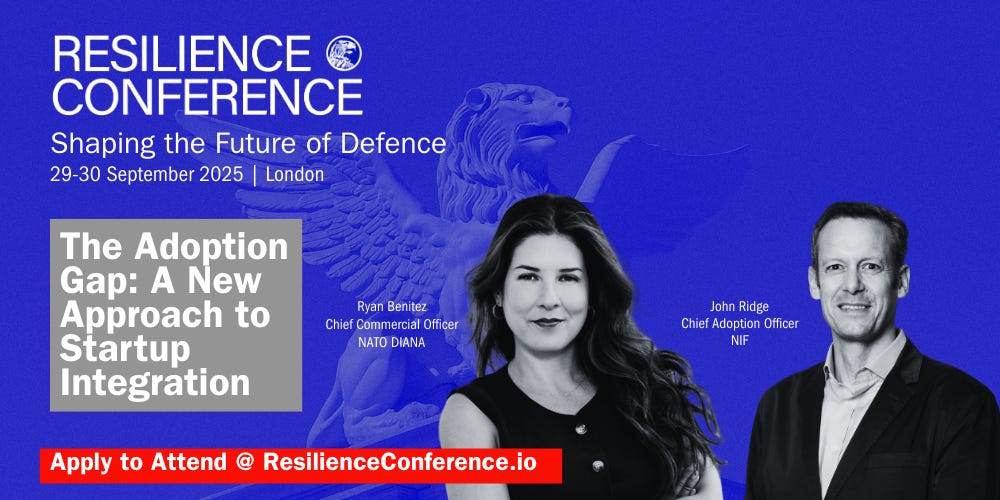Stark Raises $62M For Its Strike Drones and UAV Control Systems, Offset Labs Secures Seed Funding For Its Defence and National Security AI Lab
Issue 39: Stark has raised more capital in less time than their highly-capitalised competitors. We’re also breaking the news that Offset Labs has secured seed funding from Archangel.

Good afternoon from the team at Resilience Media
Last week we ran a piece on Stark. From my background over years covering tech in Silicon Valley, I find their story fascinating: a company without a traditional C-level structure raised $62M led by venture capital titan Sequoia Capital. This is no small feat. It means Stark has raised more capital in less time than their highly-capitalised competitors. Along with Stark’s overtly stated commitment to industry collaboration across defence primes as well as startups, this raise demonstrates just how differently the defence industry operates compared to traditional startup ecosystems.
As we build out Resilience Media, our writers are developing their understanding of this very unique sector of the tech ecosystem. Building on their deep experience of mainstream tech, they are layering onto that the nuances of this sector, for example the security concerns that sometimes make founders and investors shy away from the limelight in a way that is quite opposite to what we were used to in Silicon Valley. We are also realising that this defence tech sector is having to learn about comms, often from scratch. We will be writing more about this, offering our advice on how to go about comms and PR in this unique environment.
Funding Announcements
It’s been a busy week with a lot of funding announcements as summer comes to a close. Today, we broke the news that Offset Labs has secured seed funding from Archangel with participation from Amadeus Capital and Seven Ventures. Meanwhile, Israeli company Sola has raised $35M to ramp up Its AI-based cybersecurity tooling. You can read about both in our Funding Announcements and Startup Watch sections below.
In additional funding news, Phasecraft, a specialist in quantum algorithms, raised $34M and Poland’s State Development Bank Backs ICEYE with Strategic Investment.
Elsewhere on Resilience Media:
China’s Years-Long Salt Typhoon Hack Penetrates Military And Government Networks Worldwide
NATO Trains for Drone Warfare in Latvia — With Lessons from Ukraine’s Frontlines
Next week DSEI descends upon London. On Tuesday I’ll be moderating a panel called Lithuania: Fast, Secure, and Reliable—Building Tomorrow’s Supply Chains in the Aerospace Forum. Swing by and say hello. Some of the rest of the team will be on site with me over the three days. Send us a note to set up some time.
Don’t miss our on-going Resilience Conference Agenda announcements and get one of the few tickets we have left — more details below.
-Leslie, co-founder, Resilience Media
Archangel has led the pre-seed round in Offset Labs, the first defence and national security AI lab built by a team split between London and Kyiv. Amadeus Capital Partners and Seven Capital also joined the round.
Offset Labs was founded by engineers Denys Budnyk, Borys Nadykto, and Andrii Yakovyna. The group has already designed and deployed AI models for signal and voice processing in operational environments, a track record that puts them in rare company among Europe’s defence-tech startups. Read the full piece here.
Resilience Conference Panel Announcement
Startups can build brilliant prototypes — but how do those innovations become trusted tools for militaries and industry partners? NATO is experimenting with a new model to answer that question. The Adoption Gap: A New Approach to Startup Integration panel brings together two leaders at the forefront of the effort: Ryan Benitez, Chief Commercial Officer of NATO DIANA, and John Ridge, Chief Adoption Officer of the NATO Innovation Fund. Their roles are the first of their kind in the startup ecosystem — focused on connecting startups with the networks, customers, and pathways needed for adoption.
In this conversation, they’ll explore why bridging the gap between innovation and operational use matters now more than ever, what NATO is doing differently, and what lessons wider industry and government can draw from their approach.
Be part of the community shaping the future of defence, security, and resilience — alongside top investors, operators, government officials, and founders.
📍 London | 🗓️ September 2025
🎟️ Secure your ticket today.
Earlier this year, Israeli cybersecurity startup Sola emerged from stealth with $30 million and ambitions to become the “Stripe for Security”: a platform for security and IT teams to build customised no-code and low-code security tooling, knitting together the disparate security apps that were already being used to help them work together in a more effective way.
Now with some 2,000 customers picked up since releasing its first beta in May, Sola is ramping up its business. The startup has closed a Series A of $35 million from a raft of top investors to expand its team and its technology. On the roadmap: a lot more AI, said co-founder and COO Ron Peled.
“Today, users are prompting AI all day long,” he said in an interview. “What we are building is proactive AI. Once you connect sources into Sola, Sola will prompt the user.” Read more here.
China
Can TV Help Prepare for Invasion?
China’s Latest Missiles, Drones and Submarines, Up Close
Europe
Russia Suspected of Jamming GPS for E.U. Leader’s Plane, Officials Say
Startups
Ukraine shows off a deadly new cruise missile
Ukraine
Opinion | He Was a Star in Russia’s Media World. Now He’s a Corporal in Ukraine’s Army
Ukraine Pursues a Weapons Buildup More Potent Than Any Security Guarantee
Russia’s Top Drone Maker Faces Collapse After Ukrainian Strikes and Crushing Debts






